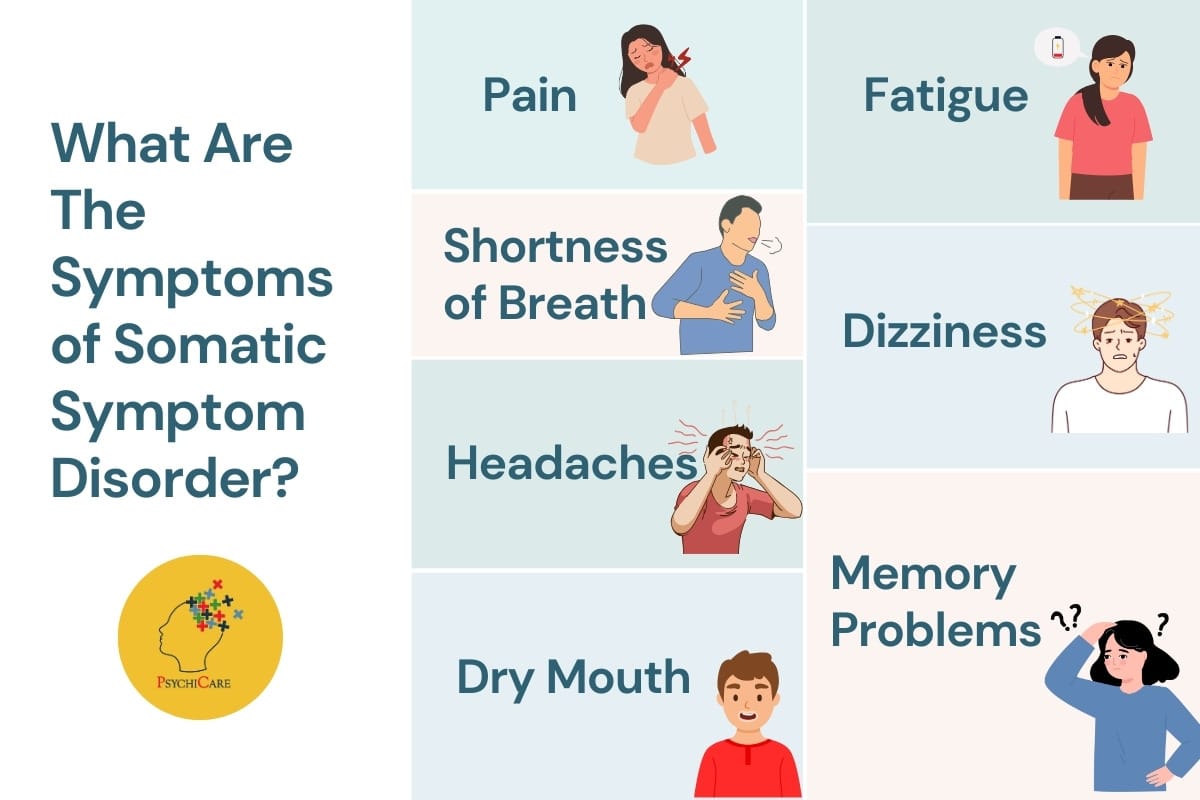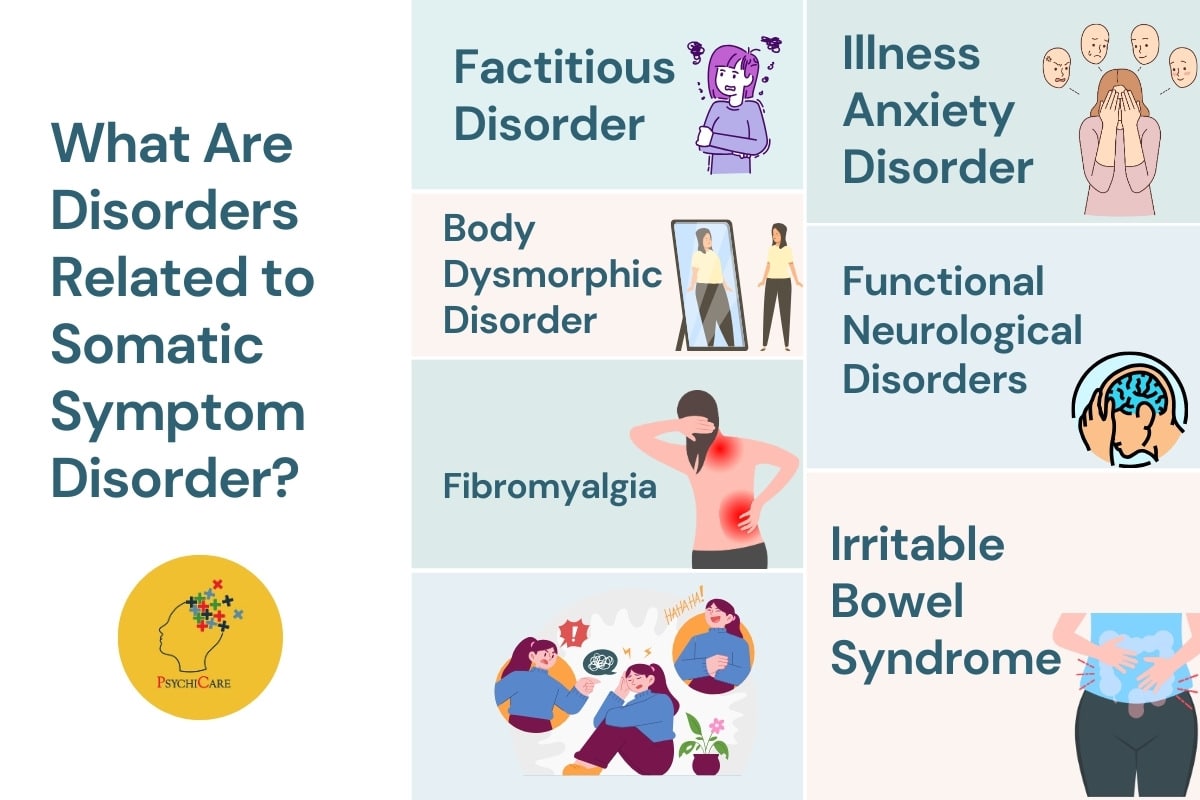Sometimes, when you’re under a lot of stress or feeling extremely anxious, you might find yourself walking around in a daze. You may also know someone who constantly feels sick, even when all their medical tests come back normal.
These are mild signs of somatic symptom disorder (SSD), something everyone experiences from time to time. But if these symptoms become severe, happen often, and cause serious distress in your life, it could mean you have SSD.
In 2025, about 5% to 7% of people have somatic symptom disorder, and women are more likely to be affected than men. The good news is that treatment can help. Cognitive-behavioral therapy (CBT) is one of the best ways to manage SSD, helping you change negative thought patterns and cope better with symptoms. Regular check-ins with a trusted doctor can also make a big difference.
What is a Somatic symptom disorder?
Somatic symptom disorder is when you focus too much on physical symptoms like pain or fatigue, causing emotional distress and anxiety. Even if medical tests show nothing serious, you may still feel convinced that something is wrong.
What Are The Symptoms of Somatic Symptom Disorder?
Somatic Symptom Disorder (SSD) causes people to focus too much on physical symptoms, even when no serious medical issue is found. Here are some common symptoms:
Pain
You may feel aching, cramping, or sharp pain in different parts of your body, like muscles, joints, or bones. This pain can come and go or stay for a long time, making it hard to do daily activities.
Fatigue
Feeling tired all the time, even after resting, is common. You may struggle with low energy and have trouble staying active throughout the day. Sleep problems can also make fatigue worse.
Shortness of Breath
You may feel like you can’t get enough air, even if your lungs and heart are healthy. This can add to anxiety and make you feel more distressed.
Dizziness
Feeling lightheaded or unsteady is another symptom of SSD. It may happen suddenly and make it difficult to focus or move around safely.
Headaches
Frequent headaches or migraines may occur, sometimes without a clear cause. The pain can range from mild to severe, affecting concentration and daily life.
Dry Mouth
You might often feel like your mouth is dry, even when you drink enough water. This can be uncomfortable and may be linked to stress or anxiety.
Hot or Cold Sweats
You may experience sudden sweating, either feeling too hot or too cold. This symptom often happens with anxiety or stress.
Trouble Concentrating
Focusing on tasks or conversations may be difficult. Your mind might keep going back to your physical symptoms, making it hard to pay attention to other things.
Memory Problems
You may struggle to remember things, feel forgetful, or have trouble recalling details. Anxiety and stress can make this worse over time.
Extreme Anxiety About Symptoms
You may worry too much about your symptoms, fearing they mean you have a serious illness. Even if doctors reassure you, the fear may not go away.
Uncertainty About Mild Symptoms
A small ache or discomfort can feel like a sign of a major health issue. This can cause ongoing stress and lead to frequent doctor visits.
Difficulty Functioning in Daily Life
Constant worry about your health can make it hard to focus on work, relationships, or daily tasks. You may spend a lot of time thinking about symptoms, checking your body, or searching for answers.

Following are a few noteworthy observations about the extreme feelings
- Seeing usual bodily feelings as a symbol of a big physical sickness.
- Dreading that the signs are severe, even when there is no proof.
- Thinking that bodily feelings are intimidating or damaging
- Feel that the medicinal assessment has not been conducted systematically.
- Fearing that physical activity may cause damage to your body
- Frequently monitoring your physical for anomalies
- Frequent health care visits that don’t relieve your concerns or that make them worse
What Are Disorders Related to Somatic Symptom Disorder?
Several disorders are closely related to Somatic Symptom Disorder (SSD). These conditions also involve excessive focus on physical symptoms or health concerns.
Factitious Disorder
People with factitious disorders pretend to have medical symptoms without a clear reason. They may fake illness, exaggerate symptoms, or even harm themselves to appear sick. Unlike SSD, they are aware that they are not actually ill but continue the behaviour for attention or other personal reasons.
Illness Anxiety Disorder
Previously known as hypochondria, this disorder causes extreme worry about developing a serious illness. Even if medical tests show no issues, a person with illness anxiety disorder continues to believe they are sick or at risk of becoming seriously ill.
Body Dysmorphic Disorder
This disorder makes people obsess over small or even nonexistent flaws in their appearance. They may spend hours checking mirrors, seeking cosmetic treatments, or feeling extremely distressed about how they look.
Functional Neurological Disorders
People with these disorders experience neurological-like symptoms, such as paralysis, seizures, or blindness, without any medical explanation. These symptoms often result from stress or psychological distress rather than a physical condition.
Fibromyalgia
Fibromyalgia causes widespread pain, fatigue, and sleep issues. Although the exact cause is unknown, it is considered a functional disorder, meaning it affects how the body works rather than being linked to visible damage or disease.
Irritable Bowel Syndrome (IBS)
IBS is a digestive disorder that leads to stomach pain, bloating, diarrhoea, or constipation. Like fibromyalgia, the exact cause is unclear, but stress and emotional factors can make symptoms worse.

These related disorders share some common features with SSD, including persistent and distressing physical symptoms, significant impairment in daily functioning, and a high degree of psychological distress. Effective treatment for SSD and related disorders typically involves a combination of therapy, medication, and lifestyle changes to help manage symptoms and improve overall well-being.
Somatic Symptom Disorder DSM-5
Somatic Symptom Disorder (SSD) is classified in the DSM-5 (Diagnostic and Statistical Manual of Mental Disorders, 5th Edition) as a mental health condition where a person experiences excessive worry, thoughts, and behaviours about physical symptoms.
Symptoms and Diagnosis
People with SSD often have symptoms such as:
- Pain (chronic aches, headaches, or joint pain)
- Fatigue (persistent tiredness despite rest)
- Digestive issues (nausea, bloating, or stomach pain)
These symptoms cause significant distress and interfere with daily life. However, they may not have a clear medical cause or may be worse than expected for a known condition.
Diagnosis Criteria:
- Symptoms last for at least six months
- The person is excessively focused on their health
- They may visit multiple doctors despite no serious medical findings
Severity Levels
- Mild: One distressing symptom with some health-related anxiety
- Moderate: Multiple symptoms and frequent worry
- Severe: Extreme health anxiety, multiple physical complaints, and daily life disruption.
Somatic Symptom Disorder vs. Illness Anxiety Disorder
Somatic Symptom Disorder (SSD) and Illness Anxiety Disorder (IAD), also called Hypochondriasis, are both conditions that cause excessive health-related anxiety. However, they have important differences.
Key Differences
- Somatic Symptom Disorder (SSD): People with SSD experience real physical symptoms (like pain or fatigue) that cause significant distress, even if doctors cannot find a medical explanation. They may constantly worry that their symptoms indicate a serious illness.
- Illness Anxiety Disorder (IAD): People with IAD have an intense fear of having a serious illness, even when they have little to no physical symptoms. Despite normal test results, they still believe they are sick.
Comparison Chart
| Feature | Somatic Symptom Disorder (SSD) | Illness Anxiety Disorder (IAD) |
|---|---|---|
| Symptoms | Physical symptoms like pain, fatigue, or nausea | Few or no physical symptoms |
| Main Concern | Distress over real symptoms | Fear of being seriously ill |
| Medical Tests | Symptoms may not match medical findings | Multiple normal test results, but still anxious |
| Behaviour | Frequent doctor visits, exaggerated symptom concerns | Constant health research, doctor shopping, reassurance-seeking |
What is Somatic Symptom Disorder Treatment?
Somatic Symptom Disorder (SSD) is treated with a combination of psychotherapy, medications, and lifestyle changes to help you manage symptoms and improve daily functioning. The goal is to reduce distress, improve coping skills, and enhance quality of life.
1. Psychotherapy (Talk Therapy)
Therapy helps you understand and manage your symptoms effectively. Common approaches include:
Cognitive Behavioral Therapy (CBT)
- Helps identify negative thoughts about health and replace them with healthier thinking patterns.
- Teaches coping strategies for managing pain, fatigue, and anxiety.
- Encourages engaging in daily activities despite symptoms.
Family Therapy
- Helps family members understand SSD and provide emotional support.
- Improves communication and reduces stress within the family.
2. Medications
While medications are not a primary treatment, they can help manage related symptoms like depression and anxiety:
- Antidepressants (e.g., SSRIs, SNRIs) – Reduce symptoms of depression and may also help with pain.
- Anti-anxiety medications – Useful if severe anxiety is present, but should be used with caution.
- Antiepileptics & Antipsychotics – Sometimes prescribed for specific cases, especially when SSD coexists with other conditions.
3. Lifestyle and Other Treatments
Besides therapy and medication, daily habits and coping strategies play a key role in managing SSD:
Regular Visits with a Trusted Doctor
- Seeing a consistent healthcare provider can help avoid unnecessary tests and medical procedures.
- Provides reassurance and long-term support.
Pain & Symptom Management Strategies
- RICE Technique (Rest, Ice, Compression, Elevation) for muscle-related pain.
- Relaxation techniques like deep breathing, meditation, and progressive muscle relaxation.
- Physical therapy for improving movement and reducing discomfort.
Stress Management & Coping Skills
- Practising mindfulness and meditation to reduce stress.
- Engaging in regular exercise to boost mood and overall health.
- Setting realistic goals to maintain a sense of accomplishment.
Maintaining Social and Daily Activities
- Staying active and social even if symptoms persist.
- Engaging in hobbies and activities to shift focus from physical discomfort.
Tips for Managing SSD
✔ Build a strong, trusting relationship with your doctor for reassurance and guidance.
✔ Avoid unnecessary medical tests and procedures that may reinforce anxiety.
✔ Stay active and engaged in daily life, even when symptoms are present.
✔ Practice healthy sleep habits and a nutritious diet for overall well-being.
Therapy & Counselling For Somatic Symptom Disorders
Are you experiencing physical symptoms with no clear medical cause? You may be struggling with a Somatic Symptom Disorder. Our therapy program can help. Our team of experts specializes in treating the mind-body connection and helping you manage symptoms such as chronic pain, fatigue, and more.
With a personalized approach, we’ll work together to identify the root cause of your symptoms and develop a plan to bring you relief. Take the first step towards a healthier, more fulfilling life. Book a consultation today and start your journey to healing.


